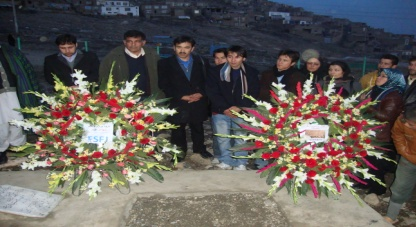AHRDO | February 12, 2010
“Nobody has the Right to Forgive the Perpetrators”
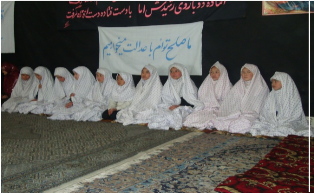 The Afghanistan Human Rights and Democracy Organization (AHRDO) in collaboration with the Foundation of Solidarity for Justice (FSJ) and the representatives of Afshar Victims marked the 17the anniversary of the “Afshar Massacre” on 12 February 2010 where the victims, human rights and civil society organizations, MPs, journalists and cultural and social activists participated. In this event, the victims as well as the representatives of the victims of the Afshar Massacre were provided with opportunities to share their eyewitnesses, suffering, and first-hand accounts of how the massacre took place, who the perpetrators were and what went with the survivors after wards, with their audience and participants.
The Afghanistan Human Rights and Democracy Organization (AHRDO) in collaboration with the Foundation of Solidarity for Justice (FSJ) and the representatives of Afshar Victims marked the 17the anniversary of the “Afshar Massacre” on 12 February 2010 where the victims, human rights and civil society organizations, MPs, journalists and cultural and social activists participated. In this event, the victims as well as the representatives of the victims of the Afshar Massacre were provided with opportunities to share their eyewitnesses, suffering, and first-hand accounts of how the massacre took place, who the perpetrators were and what went with the survivors after wards, with their audience and participants.
In the same event, representatives of the civil society organizations and Afghanistan’s parliament were given chance to speak about the broader ramifications of these massacres, the responsibilities of the Afghanistan government and the efforts that have been made towards the implementation of the Action Plan on Peace, Reconciliation and Justice in Afghanistan.
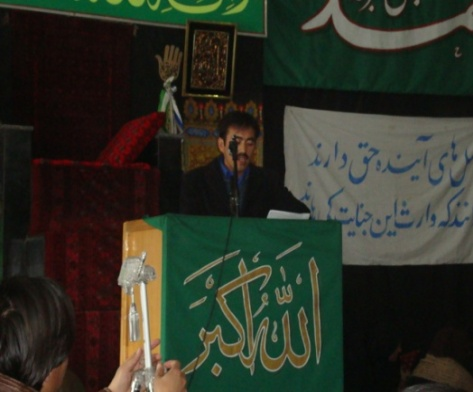 Mr. Khudad Bisharat, the Managing Director of AHRDO, said in his speech that: “Afshar was one of the historical tragedies that can never be forgotten. It will always agonize us to remember Afshar. To mark Afshar will always torture our spirit”. Mr. Bisharat added that:” yes, Afshar must be marked because Afshar is the most pressing historical text of the oppressed and at the same time the most compelling witness to the truth of this tragedy…… Afshar is the doomsday that reconstructs the depth, the authenticity and the entirety of the tragedy”. Mr. Bisharat further added that: why tragedies like Afshar where an” entire city of human beings” is perished and all the houses ruined is being neglected by intellectuals and human rights activists?”. Bisharat continued that: “The fact that Afghan lives have been wasted and their basic rights have been violated systematically in the past three decades should make us more outspoken in trying to address justice for past crimes”.
Mr. Khudad Bisharat, the Managing Director of AHRDO, said in his speech that: “Afshar was one of the historical tragedies that can never be forgotten. It will always agonize us to remember Afshar. To mark Afshar will always torture our spirit”. Mr. Bisharat added that:” yes, Afshar must be marked because Afshar is the most pressing historical text of the oppressed and at the same time the most compelling witness to the truth of this tragedy…… Afshar is the doomsday that reconstructs the depth, the authenticity and the entirety of the tragedy”. Mr. Bisharat further added that: why tragedies like Afshar where an” entire city of human beings” is perished and all the houses ruined is being neglected by intellectuals and human rights activists?”. Bisharat continued that: “The fact that Afghan lives have been wasted and their basic rights have been violated systematically in the past three decades should make us more outspoken in trying to address justice for past crimes”.
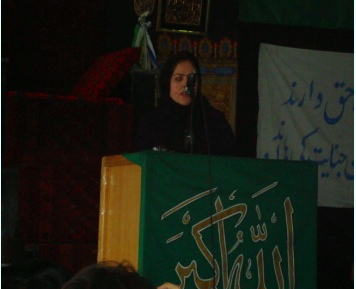 An outspoken advocate of women and human rights MP Fauzi Kofi emphasized in her speech that: “the Afshar campaign was one of the saddest events in Afghanistan. Burning women and girls in Afshar Mosque is unforgivable. In Afghanistan’s wars, it was the ordinary people who frequently fell victims… Currently, there are talks on gifting amnesty to war criminals. Nobody has the right to forgive the perpetrators of the girl who was raped in a check-point in front of Polytechnic University”.The Afshar Massacre victims and their representatives focused on explaining the depth and horrors of this campaign and complained against a continued neglect of this event by the Afghan government and the international community. One of the victims of this event, a mother who had lost six members of his family, said: “We don’t want war. The Afghan government and the international community should once listen to our voices and acknowledge our suffering”.
An outspoken advocate of women and human rights MP Fauzi Kofi emphasized in her speech that: “the Afshar campaign was one of the saddest events in Afghanistan. Burning women and girls in Afshar Mosque is unforgivable. In Afghanistan’s wars, it was the ordinary people who frequently fell victims… Currently, there are talks on gifting amnesty to war criminals. Nobody has the right to forgive the perpetrators of the girl who was raped in a check-point in front of Polytechnic University”.The Afshar Massacre victims and their representatives focused on explaining the depth and horrors of this campaign and complained against a continued neglect of this event by the Afghan government and the international community. One of the victims of this event, a mother who had lost six members of his family, said: “We don’t want war. The Afghan government and the international community should once listen to our voices and acknowledge our suffering”.
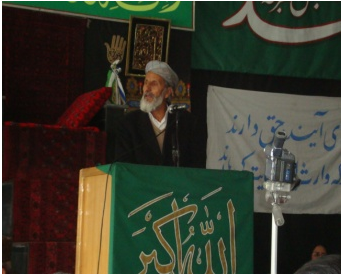 Mawlawi Mussaddiq, another victim, explained the story of how he lost his 14-year old daughter: “Father, would you bring me a pink scarf today? Yes, I will definitely bring it today, my dear daughter”. Mussadiq continued that he was in his office when he heard that the Afshar campaign had begun and that her daughter was missing. Mussaddiq said that he immediately returned to his home in Afshar when he faced many gunmen in his street and saw several dead bodies lying around. Mussaddiq added that he went to his house, found it ruined and no trace of his 14-years daughter. Mussaddiq, said that he then began searching all the hospitals and finally found the dead body of his daughter in Ali Abad Hospital.
Mawlawi Mussaddiq, another victim, explained the story of how he lost his 14-year old daughter: “Father, would you bring me a pink scarf today? Yes, I will definitely bring it today, my dear daughter”. Mussadiq continued that he was in his office when he heard that the Afshar campaign had begun and that her daughter was missing. Mussaddiq said that he immediately returned to his home in Afshar when he faced many gunmen in his street and saw several dead bodies lying around. Mussaddiq added that he went to his house, found it ruined and no trace of his 14-years daughter. Mussaddiq, said that he then began searching all the hospitals and finally found the dead body of his daughter in Ali Abad Hospital.
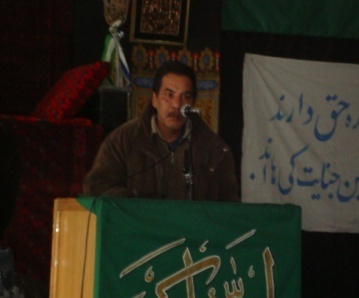 Kazim Wahidi another human rights advocate said “it is four years that we have been facing problems to mark the Afshar Massacre… yes, is the killing of a 14-years girl, murdering of hundreds of innocent civilians, plundering of houses and mosques a victory?. If it was not a victory, why they don’t come once to Afshar to announce that they had made a mistake. We do not demand their execution but they have to be dismissed from their positions of power. Their stay in the positions of power is a mockery of the blood of the victims… around 40 children aged less than a year, were beheaded. Another eyewitness said that a baby was nailed to a wall by a rifle’s bayonet. Around three hundreds women and girls disappeared and until now there is no track of where they were taken to and what happened to them. Clearly, it was genocide”.
Kazim Wahidi another human rights advocate said “it is four years that we have been facing problems to mark the Afshar Massacre… yes, is the killing of a 14-years girl, murdering of hundreds of innocent civilians, plundering of houses and mosques a victory?. If it was not a victory, why they don’t come once to Afshar to announce that they had made a mistake. We do not demand their execution but they have to be dismissed from their positions of power. Their stay in the positions of power is a mockery of the blood of the victims… around 40 children aged less than a year, were beheaded. Another eyewitness said that a baby was nailed to a wall by a rifle’s bayonet. Around three hundreds women and girls disappeared and until now there is no track of where they were taken to and what happened to them. Clearly, it was genocide”.
In the conclusion, the victims came up with an official statement that focused on the following key points:
A. Nobody has the right to forgive the perpetrators under any circumstances such as political deals and self-fulfilling incentives
B. Ensure sustainable peace centered on the execution of justice and rule of law.
C. The victims must not be forgotten or discriminated against under any circumstances.
D. To mark the memory of and empathize with the victims of Afshar Massacre a (victims’ school) must be built.
Finally, local representatives, human rights activists and victims’ families visited the Afshar mass-grave and placed floral wreaths on the grave.
